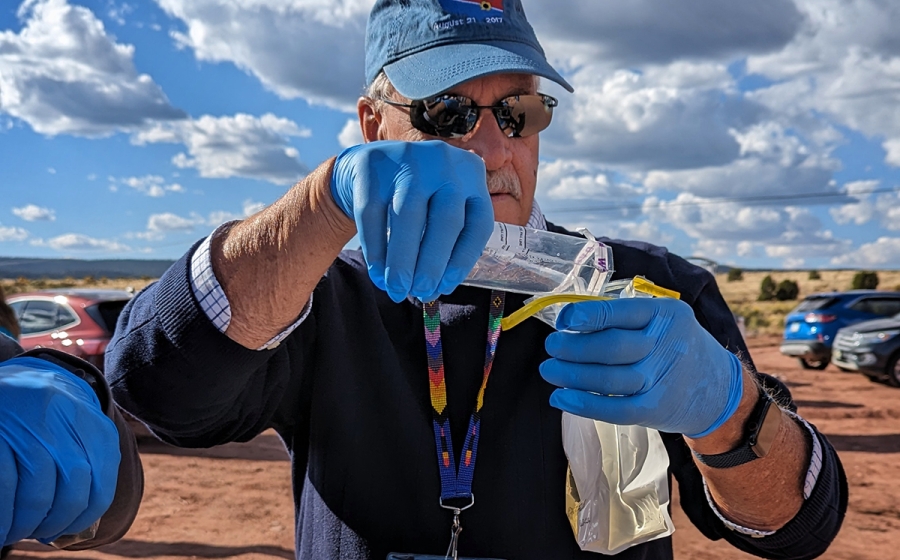How the Osprey Foundation Catalyzes Public Health Research
"On fire for public health," Bill Clarke believes mid-size philanthropic organizations can encourage researchers to take bigger risks with their work.
When Bill Clarke was working in the early 2000s with Indigenous communities in the highlands of Guatemala to create better health outcomes, he learned two enduring lessons. First, public health field research must be sensitive to community needs, as in “listen, then act.” Second, initial funding can be a way to “set the table” for a project’s next phase.

Osprey Foundation founder and president Bill Clarke assists with testing water samples at the Center for Indigenous Health's Navajo Nation Diné Water Lifeways Project in Arizona, during the School's Health Advisory Board's Public Health in Action trip in October 2023.
Over his philanthropic career, Clarke has fine-tuned and applied these lessons through multiple grant projects funded by his charitable organization, the Osprey Foundation. The foundation’s primary focus is to advance clean water, sanitation, and hygiene efforts around the globe, from sub-Saharan Africa to the Peruvian rainforest. Using Clarke’s lessons to inform the foundation’s work has made for a productive and synergistic collaboration with the School’s Center for Indigenous Health, the Johns Hopkins Water Institute, and the Navajo Nation in Arizona, which are working together on a safe drinking water project in the Diné (Navajo) community.
Clarke’s philanthropic strategy starts with that first lesson about active listening: Engage community members from the outset, agree on objectives, and ensure ongoing conversation, all of which builds a growth-focused feedback loop.
Clarke explains, “It’s important to listen to the community’s needs, understand the vision, and certainly handle critiques and suggestions. Yes, it takes time, but it builds trust—which is the ultimate accelerator for lasting impact.”
Since 2020, Osprey has provided funding for the Center’s Diné Water Lifeways Project, led by BSPH faculty member and Center director Allison Barlow. The project’s first phase, which piloted a comprehensive and culturally tailored household water needs assessment for the community, was successfully completed in Summer 2023.
Clarke spent some time this past October in Arizona with Barlow, her team, and the tribal member project leaders, and heard about what worked well for the project and what didn’t. The overall promising results prompted Clarke to negotiate a new grant to the Center, funding the pilot’s expansion, including a focus on communicating test results regularly and more quickly to the community, mindful of cultural sensitivities and scientific accuracy.
This second phase exemplifies Clarke’s other lesson: setting the table. Osprey’s funding serves as a catalyst, fueling what comes next. Barlow’s work and her team’s findings will point the way forward, enabling them to consider applying for support from larger-scale foundations and government sponsors—funders who can build on the research findings to scale interventions at a population level.

Two Diné (Navajo) community members test water for the Diné Water Lifeways Project, a water quality research project led by the School's Center for Indigenous Health and supported by the Osprey Foundation.
One of public health’s insights is to see the community as the patient, not the individual, and Clarke heartily agrees. He has seen time and again how public health delivers results using a community-forward approach. And seeing those projects take off, he says with a chuckle, is the reason he frequently finds himself “on fire for public health.”
Suzanne Flinchbaugh is a writer in the Office of External Affairs at the Bloomberg School. For more information about the Center for Indigenous Health's work and how philanthropy can support other efforts, please contact Kathleen Grealish, director of Development, at kgreali1@jhu.edu.
